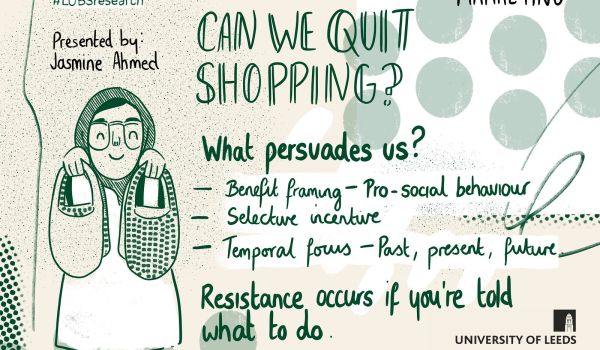A story of perseverance: how a failed study led me to a breakthrough in sustainable shopping research
- Centre for Decision Research

When I first began exploring how to get people to shop less for the sake of the planet as part of my PhD, I thought the message was simple: tell people the facts, show them the impact, and they’ll change their habits.
With that in mind, I designed an experiment exploring environmentally-framed messages (where the focus is on the benefits to the environment) versus socially-framed messages (which focus on benefits to the individual or society) and their impact on getting consumers to reduce their shopping.
I presented this idea at Leeds University Business School’s Doctoral Research Conference – an event that gives Postgraduate Researchers (PGRs) an opportunity to present their research in front of peers and academics and gain valuable feedback - in 2022. My research merged sustainability and psychology, particularly the theory of psychological reactance, which is about how people respond when they feel their freedom is being threatened.
I received strong, encouraging feedback from the panel, who told me I was essentially working in the realm of demarketing, encouraging people to consume less rather than more. It was exciting. I felt like I was on to something meaningful, especially with the fast fashion crisis still growing.
But when I conducted three experiments, they failed. The data just didn’t support the hypothesis, and the methods I used weren’t working. It was disheartening. After long conversations with my supervisors, we decided I should step back from the project and instead focus on another side project I had about brand cancellations.
I set the “shopping less” topic aside, conducted some successful experiments to test my hypothesis in this different area of research, and finished writing my thesis about brand cancellations (titled “How perceived luxury shields brands from cancellation movements”).
But something about the sustainable shopping topic kept pulling me back.
After I submitted my thesis, I found myself thinking about that early research again. I still believed the topic mattered, now more than ever, so, I decided to give it one last shot. This time, I redesigned the experiments and undertook some further data collection, adjusting the messaging conditions to focus on how different tones (focusing on assertive versus suggestive message framing), rather than just content, could change how people respond.
And it worked.
The results showed that when you tell people what not to do, using commanding language like “Don’t buy this” or “Stop shopping now!”, they feel angry and resistant. That’s psychological reactance at play. But when you suggest rather than demand, using phrases like “Shop wisely for a greener future”, people respond far more positively. They’re more open to change because they feel in control of the decision.
This was the breakthrough moment. I turned the research into a paper titled “Don’t tell me what to do: how different messaging strategies in shopping reduction campaigns trigger psychological reactance among consumers.” I submitted it to the American Marketing Association (AMA) Winter Conference, and it was accepted. I flew out to Phoenix, Arizona, and presented it in person.
The reception was incredible. Not only did I receive valuable feedback, but I also had researchers approach me with offers of collaboration. For the first time, I saw how this work could have a broader academic impact.
But it didn’t stop there.
In January, I decided to pitch the story to The Conversation, a platform that bridges the gap between academia and the public. I wasn’t sure what to expect - this would be my first time writing for a non-academic audience. But the editor loved the topic and encouraged me to develop it. A few weeks later, my piece went live: “Shop smarter, not harder: how gentle messaging can help the planet more than tough talk”.
Within four days, it had over 3,000 reads!! Even now, I cannot believe this.
I started getting emails, people wanted to talk, ask questions, and even collaborate. A professor from the US invited me to be a guest speaker at a sustainability event. A science journalist got in touch to ask if I could help contribute to an article on tech waste reduction, using insights from my work. All from one article, based on research I almost gave up on.
If there’s one thing I’ve learned as a PGR, it’s this: don’t stop.
It’s easy to lose confidence when your experiments fail. It’s easy to shelve projects that feel too messy or too uncertain. But sometimes, what feels like failure is just a draft - a version that needed refining. If I had walked away from my initial research idea completely, none of this would have happened. Not the AMA conference, not the published article in The Conversation, not the speaking opportunities, and certainly not the chance to help influence real conversations about sustainability.
So if you’re a fellow PGR reading this, here’s my message to you:
Keep going.
Don’t let setbacks define the value of your research.
Don’t let rejection or failure convince you that your idea doesn’t matter.
Stay curious, keep refining, and trust that the work you’re doing has potential.
Contact us
If you would like to get in touch regarding any of these blog entries, please contact:research.lubs@leeds.ac.uk
Click here to view our privacy statement. You can repost this blog article, following the terms listed under the Creative Commons Attribution-NonCommercial-NoDerivatives 4.0 International licence.
The views expressed in this article are those of the author and may not reflect the views of Leeds University Business School or the University of Leeds.

